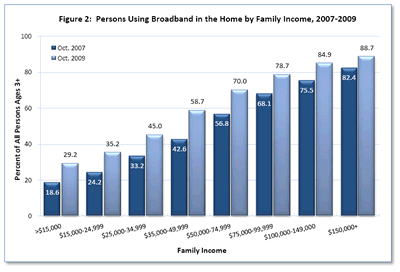Recently, I have begun making Captivate demonstrations for external customers. For these demos I do not have the security of knowing they will be accessed with a high speed connection. So, when I plop them online with a note that they are best viewed with a high speed connection I have to ask myself, "how many people do have a high speed connections?"
The U.S. Department of Commerce released a research preview last month Digital Nation: 21st Century America's Progress Toward Universal Broadband Internet Access. Here are some of the charts included in the report, which provide insight into broadband access in the United States including demographic information. As you will also see, the "digital divide" is also reflected in the data.




Source: Digital Nation: 21st Century America's Progress Toward Universal Broadband Internet Access, February 2010.
The report also delves into statistics on households with no Internet access at all. The U.S. Department of Commerce will have a more detailed analysis and report later this year. They will be using data from the 2010 census for the full report.
"In a globalized 21st century economy, when you don’t have regular access to high-speed Internet, you don’t have access to all the educational, business and employment opportunities it provides." - U.S. Commerce Secretary Gary Locke.


 This month's
This month's